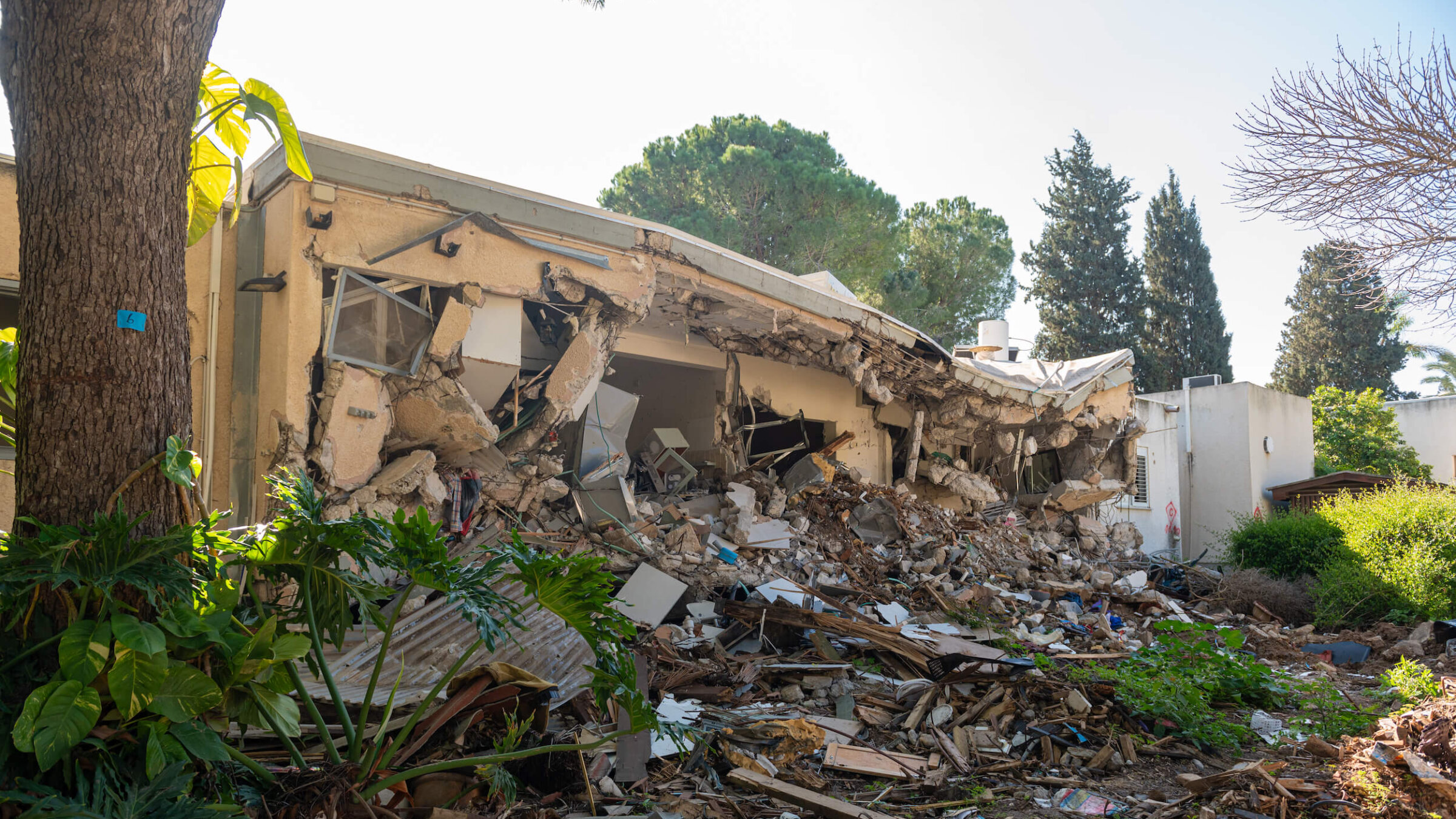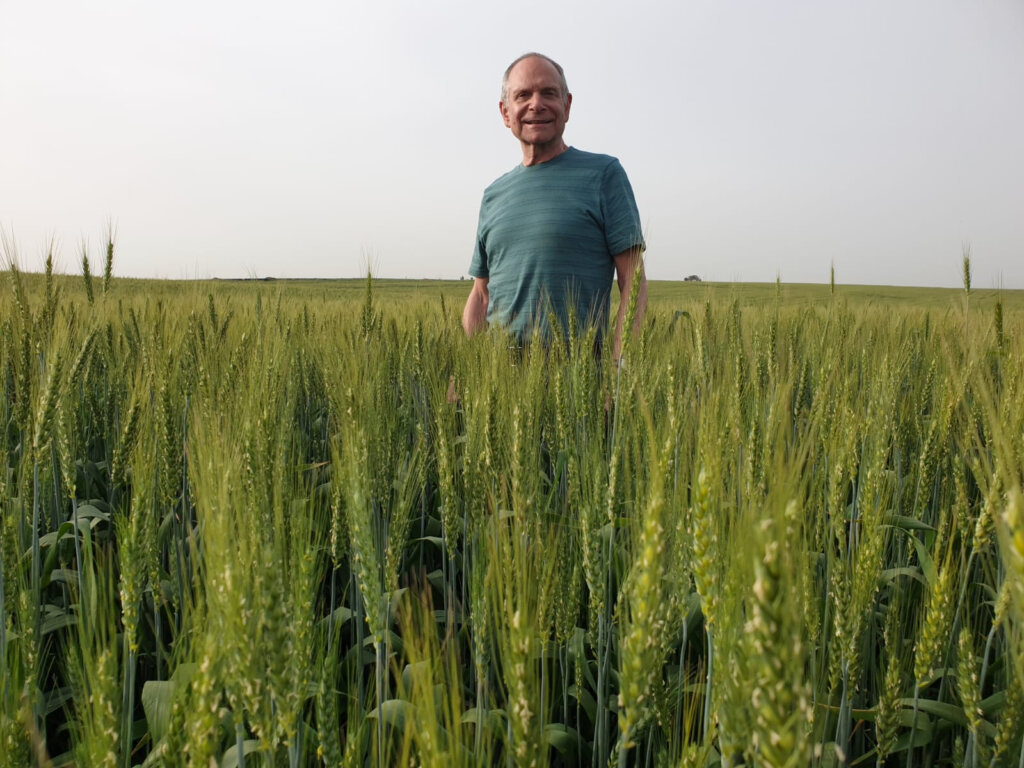Almost 5 months after Oct. 7, my Israeli brother-in-law still wonders ‘what the hell happened?’
Far from recovered after the Hamas attack, the residents of the Negev are dealing with a ‘post-post traumatic’ new reality

A house left in ruins after the Oct. 7 attack by Hamas militants. Photo by Noam Galai/Getty Images
My brother-in-law, David Levy, lives on a kibbutz just 20 miles from Gaza. He’s lost count of how many funerals and shiva calls he’s attended since Oct. 7.
But he vividly remembers one of them.
“It was for one of my farm managers who lost his son in the IDF,” he told me during a long WhatsApp video call. “I got in the car and turned to my colleague and said, ‘I hope this is the last time I have to pay a shiva call for a soldier in this war.’ And he said, ‘It’s not going to be the last time.’ And I just lost it. I just cried.”
David paused, revisiting the emotion. “And it’s not been the last time,” he said.
I last wrote about David on Oct. 7. We spoke on the evening of the Hamas attack, which was then still ongoing. It was morning in Los Angeles, and in my column posted the same day, he told me about the non-stop barrage of rockets that had landed near Kibbutz Mishmar HaNegev, his home for 47 years. He expressed the raw anger so many Israelis felt.
“This is such a colossal failure,” he said at the time, “a colossal political failure, diplomatic failure, intelligence failure and military failure, colossal like the Yom Kippur War.”

I had asked him what he thought Israel would do.
“Obviously, Israel is going to make sure that Hamas pays a very, very, very big price on what happened,” he said — which turned out to be an understatement. “But I don’t know what that means, because I don’t know what the goal is.”
Now, almost five months since Hamas terrorists crossed over from Gaza, killed almost 1,200 people and took another 250 hostage, David still isn’t sure what the government’s goals are. To destroy Hamas militarily? To rule Gaza? And then what?
But he knows what he wants: security.
“We need to know that it’s safe,” he said. “Not a feeling of safe, not them telling us it’s safe, but actually safe.”
No safety to be found
The feeling of safety that Oct. 7 shattered hasn’t returned, David said. In the north, one of his daughters, a Ph.D. in environmental science, had her research lab in Kiryat Shmona shut down due to Hezbollah rocket attacks. Many of her team members have been called up to military service.
In the south, the kibbutzim along the Gaza border are still largely empty of inhabitants.
“I was there this week, and I can tell you, it’s still not safe,” he said, speaking from his kibbutz home just a few miles away.
A terror attack that killed two Israelis at a bus stop last week took place only 200 yards from David’s office at the Re’em Junction. Two days earlier, a Hamas rocket was intercepted above the southern city of Ashkelon, fired from an area Israeli troops had previously cleared.
All this means most of the region’s former residents aren’t returning any time soon.
“They’ll have to be convinced, especially those that have children,” David said, pointing out that schools and health services along the Gaza border haven’t reopened. “I don’t know how they’re going to put these kibbutzim together again.”
Food insecurity
One of David’s biggest concerns isn’t whether Israel can defend itself, but whether it can feed itself.
David immigrated to Israel in 1977 at the age of 19, and started working on the kibbutz farms. Eventually, he earned a masters in agricultural economics; now he’s the general manager of the Israel Association of Field Crop Growers.
About one-third, or 30,000 acres, of southern Israel’s wheat fields are within five miles of the Gaza border. The sun-soaked area also provides much of the country’s barley and vegetable crops, and is home to a massive dairy herd.
Remarkably, volunteers and kibbutz members who relocated far away after Oct. 7 still visit regularly to work the land, tend the cows and repair damage from the Hamas attacks.
A few days before we spoke, David toured Nahal Oz with a team from the Ministry of Agriculture. On Oct. 7, Hamas terrorists infiltrated the kibbutz, killing 14 residents and 60 IDF soldiers. Now, workers were planting potatoes a few hundred meters from the Gaza border, watched over by a tank.
“They’re doing it,” David said of the agricultural renewal. “It’s really remarkable what’s going on.”
Yet he remains troubled by the new agricultural status quo, and feels that Israel isn’t investing enough in the industry.
The country imports most of its food, even more when animal feed is taken into account. The thousands of Palestinians who worked in the sector before Oct. 7 won’t be returning anytime soon. And the Thai workers who made up much of the rest of the workforce have yet to return en masse; dozens were killed during the Hamas attack.
At the same time, the international backlash to Israel’s invasion of Gaza, with threats of boycotts and embargoes, show how important the country’s homegrown food system is.
“There hasn’t been proper investment in Israeli agriculture for many years,” David said. “I just hope now there’s an appreciation, after Oct. 7, of the importance of Israeli food security, of the importance of having agriculture, to hold on to the land itself, for security’s sake.”
After all, Hamas attacked agricultural as well as civilian targets, David said. At Nahal Oz, the farm manager showed David where Hamas terrorists fired a rocket-propelled grenade into the irrigation reservoir, destroying the plastic shell that held the water.
“They knew where everything was,” he said, “and it was all destroyed.”
No talk of peace
The farm manager’s neighbors were all killed, as were many of David’s friends and colleagues in the area. Amiram Cooper, with whom David worked for years when he ran the local potato cooperative, is still being held hostage in Gaza. He just turned 85.
No one, left, right or center, is talking about peace, David said. And they are skeptical of news reports about the devastating effect of the Israeli attack on Gaza, just as they are of the army’s claims of success.
“America killed, what, a million Vietnamese, and it still lost the war,” he said. “If the hostages don’t come home, or come home in a box, then no matter what the outcome is, for at least half of the population, this war won’t be perceived as won.”
David has found reasons for hope, including the generosity and bravery of his Bedouin neighbors in Rahat, a city of 76,000 near his kibbutz. Residents there saved kibbutz members on Oct. 7, and reached out afterward to show support. He’s also found inspiration in the IDF itself, which, after its inexplicable failures to prevent Oct. 7, mobilized effectively. And in the resilience of average Israelis, who have stepped up to fight, volunteer and organize — despite the trauma.
And yet he knows the toll of the war, on himself and his peers, has been incalculable. “I must be so post-post traumatic that I don’t even realize that myself, right?” he said.
What still disturbs him most are two lingering questions, questions I first heard him ask on Oct. 7, and which he asked once again at the end of our conversation.
“One is, what the hell happened on Oct. 7? It’s still not clear how they did what they did,” he said.
“Number two is, somebody has to tell us what the f– is going on? Tell us, okay, this is what we’re aiming for in six months, in two years.”
Insecurity breeds uncertainty, and that, he said, is making a lot of people crazy.
“What will be the day after, if there’s such a thing as the day after,” he said. “I don’t know.”




















